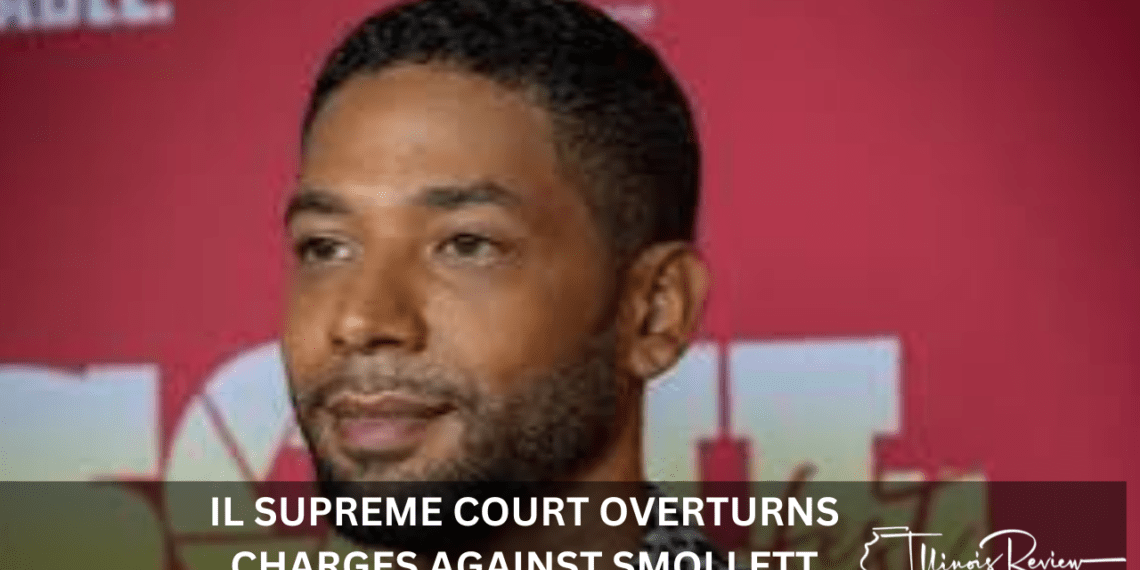In a stunning reversal that sets a chilling precedent, the Illinois Supreme Court has overturned the conviction of Jussie Smollett, the former “Empire” actor who orchestrated a hate crime hoax in 2019. Smollett’s initial 2021 conviction for five counts of disorderly conduct has now been wiped away, sparking outrage among those who see this as yet another example of Illinois’ broken justice system. The ruling focused on an earlier decision by Cook County State’s Attorney Kim Foxx, who dismissed Smollett’s initial charges under questionable circumstances. According to the Illinois Supreme Court, pursuing a second prosecution violated Smollett’s due process rights because the state had already agreed to drop the charges in exchange for his cooperation.
In its opinion, the court wrote, “A second prosecution under these circumstances is a due process violation, and we therefore reverse defendant’s conviction.” Critics argue this decision undermines accountability for those who manufacture hate crime narratives for personal or political gain.
Smollett’s staged hate crime grabbed national headlines in January 2019. The actor, who is Black and gay, claimed two masked men attacked him on a Chicago street, hurled racist and homophobic slurs, and tied a noose around his neck. The media quickly latched onto the story, portraying Smollett as a victim of America’s deep racial and social divides. But the truth unraveled quickly. Evidence revealed Smollett had hired two brothers he knew from the set of “Empire” to carry out the fake attack, paying them $3,500. The elaborate hoax was exposed as a self-serving publicity stunt designed to boost Smollett’s career. While Smollett’s lies were damaging enough, the fallout from this Supreme Court ruling could embolden others to exploit hate crime laws for personal or political purposes.
Kim Foxx’s handling of the case has been under scrutiny since 2019, when she dropped all 16 charges against Smollett, citing a deal she made with him. Foxx later recused herself from the case after it was revealed she had communicated with one of Smollett’s relatives during the investigation. The public outcry led to the appointment of special prosecutor Dan Webb, who reopened the case and secured a guilty verdict in 2021. Smollett was sentenced to 150 days in jail, 30 months of probation, and ordered to pay $130,000 in restitution. Yet, Smollett served only six days behind bars before appealing his sentence. Now, Foxx’s original decision to drop the charges has come full circle. The Supreme Court’s ruling leaned heavily on the agreement Foxx made with Smollett, despite widespread criticism of her actions.
The Illinois Supreme Court cited the case of Bill Cosby as a precedent, where a similar prosecutorial promise was upheld by the Supreme Court of Pennsylvania. The court argued that even if the public finds such agreements distasteful, constitutional protections must take precedence. But what does this mean for future cases? Will this ruling encourage others to fabricate hate crimes, knowing they can strike dubious deals and walk away unscathed? The Smollett case already sparked a surge of skepticism toward legitimate hate crime victims. With this ruling, Illinois risks undermining public trust in both justice and media accountability.
From the beginning, the mainstream media’s uncritical acceptance of Smollett’s claims amplified the damage. Prominent outlets and public figures championed his story without waiting for evidence, using it to push divisive narratives. When the hoax was exposed, these same voices largely ignored their role in promoting a false narrative. This case serves as a stark reminder of how unchecked media coverage can fuel distrust and division. Moving forward, Illinois and the nation must demand better from both the justice system and the media.
For Illinois conservatives, this ruling is yet another example of the state’s misplaced priorities. At a time when Chicago struggles with record-high crime rates and dwindling public safety, the courts seem more interested in bending over backward for celebrity defendants than upholding the rule of law. Kim Foxx, already under fire for her lenient policies, leaves behind a legacy of broken trust. Her handling of this case reflects poorly on the state’s ability to hold high-profile offenders accountable. The Supreme Court’s decision only deepens that failure. With this reversal, Illinois sends a clear message: staging hate crimes for personal gain carries no real consequences. For a state already plagued by political corruption and judicial incompetence, this is a dangerous path.
The Jussie Smollett case is more than just a Hollywood scandal; it’s a glaring example of a justice system prioritizing the interests of the powerful over the principles of fairness and accountability. By overturning his conviction, the Illinois Supreme Court has set a precedent that threatens to undermine public faith in the integrity of hate crime laws. As Illinois conservatives, it’s our duty to demand reform and accountability—not just from the courts, but from the politicians and prosecutors enabling these failures. Let this be a wake-up call for voters: Illinois deserves better.









